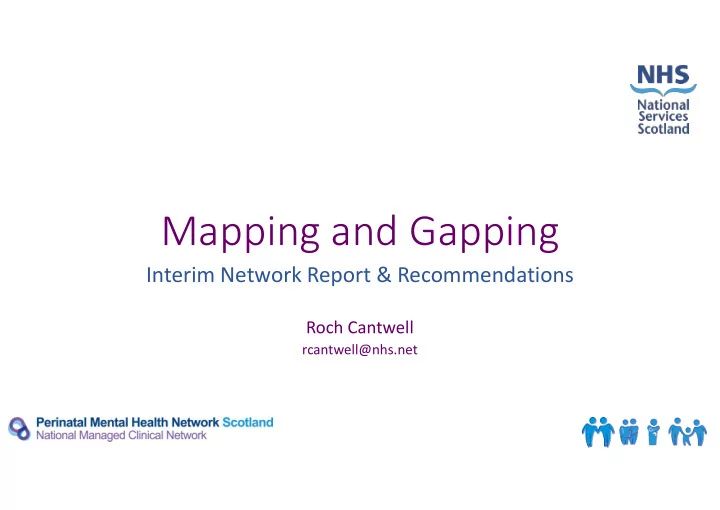

Mapping and Gapping Interim Network Report & Recommendations Roch Cantwell rcantwell@nhs.net
• Women and Families Perinatal Mental Health Charter • Survey of women’s views • Joint work with Best Start Implementation Group
• Staff education and training survey • Competencies for all staff in partnership with NES • Training recommendations and resources matched to competencies
• Service delivery outcomes • Access to MBU beds • Clinical outcomes • Core data set with outcome measures and patient feedback
• Database of all postnatal admissions in Scotland to identify pathways into care (with ISD; MWC) • Recommended models of service provision for Scotland
Mapping and Gapping NHS board visits • Visits undertaken to date • Greater Glasgow and Clyde • Borders • Lothian • Grampian • Fife • All completed by end 2018
Mapping and Gapping half-day workshops • Workshops undertaken to date • Midwives • Community Psychiatric Nurses • Planned • Health visiting • Psychology • 3 rd sector • Women & families • Continuing through 2018/19
Mapping and Gapping visits • Results/Common themes • Contribution of 3 rd sector • Lack of awareness of training opportunities • Very limited specialist infant mental health provision • Great ambition but difficulty sustaining perinatal mental health services • Areas of good practice and innovation
Mapping and Gapping visits • Results/Common themes • 3 rd sector • Education and training • Infant mental health • Specialised perinatal mental health services
Working in partnership Interim recommendations on 3 rd sector provision • The 3 rd sector is an essential component of good perinatal mental health provision • The 3 rd sector has particular strengths in managing distress and mild to moderate disorder in vulnerable populations – this requires continuing support • There is a need for additional support to evaluate and deliver programmes which enhance (i) preparation for parenthood and (ii) the parent-infant relationship in vulnerable populations • There is a need to explore models by which 3 rd sector organisations and specialised perinatal mental health services can better complement one another • Women and families led organisations require continuing support
Developing professional expertise Interim recommendations on education and training • Provision should be made for education and training resource development and delivery which complements the NES/PMHN Scotland perinatal mental health competency framework • Time should be allowed for access to training for maternity, primary care, general mental health and specialised perinatal mental health staff
Ensuring equity of care Interim recommendations on infant mental health services • Specialists in addressing complex mother-infant relationship difficulties should work alongside specialised perinatal mental health services • Some infant mental health services may be best provided on a regional/cross-boundary basis
Ensuring equity of care Interim recommendations on perinatal mental health services • Integrated Joint Boards should ensure that dedicated community perinatal mental health services exist in each NHS Board area • Design will be influenced by birth population numbers, population density and geographical location • Some aspects of service may best be provided on a regional/cross- boundary basis
Ensuring equity of care Interim recommendations on perinatal mental health services Level A. High birth number/population density areas • There should be a dedicated specialised community perinatal mental health team, including psychiatric, community mental health nurse, clinical psychology, community nursery nurse and social work staffing. Other professions may also form part of the core team, such as specialist midwives, occupational therapists etc. • The team should have the skills and capacity to case manage all referrals and to accept referrals directly from primary care, maternity and other mental health services • The team should have the skills and capacity to lead training and education for maternity, primary care, and other mental health staff
Ensuring equity of care Interim recommendations on perinatal mental health services Level B. Medium to low birth number/population density areas • Design may follow Level A or a dispersed model of provision. In a dispersed model, community nursing staff, with protected time for perinatal mental health, should be identified in each adult community mental health team • A psychiatrist and nurse team leader, each with protected time for perinatal mental health provision, should be identified to provide clinical supervision, support and case management to the dispersed team • The team should have protected time to meet regularly and should have access to additional support from clinical psychology, occupational therapy and mental health social work • The team should have the skills and capacity to case manage all (or, at minimum, more complex/high risk) referrals and to accept referrals directly from primary care, maternity and other mental health services • The team should have the skills and capacity to lead training and education for maternity, primary care, and other mental health staff
Ensuring equity of care Interim recommendations on perinatal mental health services Level C. Very low birth number/population density areas • Possible additional recommendations for very low birth number/remote areas (e.g. island communities) but awaiting visits
Recommend
More recommend